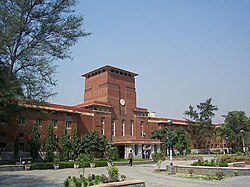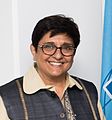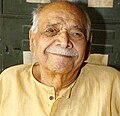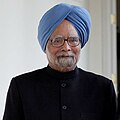University of Delhi
 |
Motto in English
| Dedicated to Truth |
|---|
| Type | Public |
|---|
| Established | 1922 |
|---|
| Chancellor | Vice-President of India |
|---|
| Vice-Chancellor | Yogesh K Tyagi |
|---|
| Visitor | President of India |
|---|
| Students | 132,435[1] |
|---|
| Undergraduates | 114,494 |
|---|
| Postgraduates | 17,941 |
|---|
Other students
| 261,169 |
|---|
| Location | New Delhi, Delhi, India
 28.69°N 77.21°ECoordinates: 28.69°N 77.21°ECoordinates:  28.69°N 77.21°E 28.69°N 77.21°E |
|---|
| Campus | Urban |
|---|
| Colours | Purple |
|---|
| Affiliations | UGC, NAAC, AIU, ACU, Universitas 21 |
|---|
| Mascot | Elephant |
|---|
| Website | du.ac.in |
|---|
The
University of Delhi, informally known as
Delhi University (
DU), is a
collegiate public central university, located in
New Delhi,
India. It was founded in 1922 by an Act of the
Central Legislative Assembly. As a collegiate university, its main functions are divided between the academic departments of the university and affiliated colleges. Consisting of three colleges, two faculties, and 750 students at its founding, the University of Delhi has since become India's largest institution of higher learning and among the largest in the world. The university currently consists of 16 faculties and 86 departments distributed across its North and South campuses. It has
77 affiliated colleges and 5 other institutes with an enrollment of over 132,000 regular students and 261,000 non-formal students. The
Vice-President of India serves as the University's
chancellor.
The University of Delhi was established in 1922 as a unitary, teaching and residential university by an Act of the then
Central Legislative Assembly of the
British India.
[6] The University was originally to be named Prince Charles University, but Rai Kedarnath, counselor to the Chief Commissioner of Delhi and founder of
Ramjas College, argued that if the university should fail, that would certainly antagonise the Prince. He suggested the name by which it is known today.
[7] Hari Singh Gour served as the university's first Vice-Chancellor from 1922 to 1926. Only four colleges existed in Delhi at the time:
St. Stephen's College founded in 1881,
Hindu College founded in 1899,
Zakir Husain Delhi College(then known as The Delhi College), founded in 1692 and
Ramjas College founded in 1917, which were subsequently affiliated to the university. The university initially had two faculties (Arts and Science) and approximately 750 students.
The seat of power in
British India had been transferred from
Calcutta to Delhi in 1911. The Viceregal Lodge Estate became the residence of the
Viceroy of India until October 1933, when it was given to the University of Delhi. Since then, it has housed the office of the vice-chancellor and other offices.
[8]
When
Sir Maurice Gwyer came to India in 1937 to serve as Chief Justice of British India, he became the Vice-Chancellor of the University of Delhi. During his time, postgraduate teaching courses were introduced and laboratories were established at the university.
[9] Members of the faculty included
Daulat Singh Kothari in Physics and
Panchanan Maheshwariin Botany. Gwyer has been called the "maker of university". He served as Vice-Chancellor until 1950.
[10]
The University has grown into one of the largest universities in India. At present, there are 16 faculties, 86 academic departments, 77 colleges and 5 other recognised institutes spread across city, with 132,435 regular students (114,494 undergraduates and 17,941 postgraduates). There are also 261,169 students in non-formal education programmes (258,831 undergraduates and 2,338 postgraduates). DU's chemistry, geology, zoology, sociology and history departments have been awarded the status of Centres of Advanced Studies. These Centres of Advanced Studies have carved a niche for themselves as centres of excellence in teaching and research in their respective areas. In addition, a number of the university's departments are also receiving grants under the Special Assistance Programme of the
University Grants Commission in recognition of their outstanding academic work.
[12]
DU is one of the most sought after institutions of higher education in India. It also has one of the highest publication counts among Indian universities.
[13]
There are 77 colleges affiliated to the University of Delhi, spread across
Delhi.
North Campus and
South Campus serve as the two main campuses of the University.
The University of Delhi started the south campus in 1973 as an effort to cope with its expansion. It moved to its present location on
Benito Juarez Marg, near
Dhaula Kuan, in 1984. The campus is spread across 28 hectares (69 acres). The various departments are located in the Faculty of Arts, Inter-disciplinary, Applied Sciences and the S.P. Jain Centre for Management Studies. South Campus has the following colleges:
Acharya Narendra Dev College,
Aryabhatta College,
Atma Ram Sanatan Dharma College, College of Vocational Studies,
Deshbandhu college,
Dyal Singh College,
Jesus and Mary College,
Maitreyi College,
Moti Lal Nehru College,
Ram Lal Anand College,
Pannalal Girdharlal Dayanand Anglo Vedic College,
Sri Aurobindo College,
Shaheed Bhagat Singh College and
Sri Venkateswara College.
Zakir Husain Delhi College, which is situated in the
central part of New Delhi, is the oldest college in Delhi carrying 300 years of legacy.
Organisation and administration[edit source]
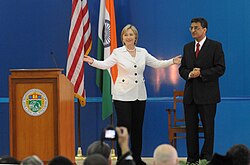
U.S. Secretary of State Hillary Clinton speaks at the University of Delhi, India 19 July 2009.
The University Court is the supreme authority of the University and has the power to review the acts of the Executive Council and the Academic Council. The Executive Council is the highest executive body of the University. The Academic Council is the highest academic body of the University and is responsible for the maintenance of standards of instruction, education and examination within the University. It has the right to advise the Executive Council on all academic matters. The Finance Committee is responsible for recommending financial policies, goals, and budgets that support the mission, values and strategic goals of the university.
Though the colleges are all constituent to the University of Delhi, as it is a
collegiate university, depending upon the funding Delhi Colleges broadly fall into three categories:
- Colleges established by Educational or Charitable Trusts.
- Colleges maintained by Delhi Administration, which acts as trust for them.
- Colleges maintained by University of Delhi.
The colleges maintained by university get 100% deficit maintenance grant while the colleges run by trusts get 95% deficit grants.
[20]
The university has 65 colleges that have liberal courses in humanities, social sciences and science. Twenty-five of these colleges are affiliated with the South Campus while the others are to the North Campus. These colleges except two —
Lady Irwin College and
Institute of Home Economics — are undergraduates The total number of colleges under the university is 77, if the colleges that run professional courses are included. Some colleges also offer evening courses.
[21]
Faculties and departments[edit source]

Faculty of Mathematical Sciences
The University of Delhi's 86 academic departments are divided into 16 faculties.
- Faculty of Applied Social Sciences & Humanities: The faculty has two departments namely - Business Economics and Slavonic & Finno-Ugrian Studies.[22]
- Faculty of Arts: It has 14 departments including Arabic, Buddhist Studies, English, Germanic & Romance Studies, Hindi, Library & Information Science, Linguistics, Modern Indian Languages and Literary Studies, Persian, Philosophy, Psychology, Punjabi, Sanskrit, and Urdu.
- Faculty of Commerce and Business Studies: It has two departments:- (i) Commerce (ii) Financial Studies.[23]
- Faculty of Education: There is only one department of Faculty of Education i.e. Department of Education.
- Faculty of Interdisciplinary and Applied Sciences: There are seven-departments which are of Bio-Physics, Biochemistry, Electronics Science, Genetics, Microbiology, Physical Education & Sports Sciences, and Plant Molecular Biology.
- Faculty of Law: The only department is of Department of Law.[24]
- Faculty of Management Studies: It also has only one Department of Business Management & Industrial Administration.[25]
- Faculty of Mathematical Sciences: It has four departments Computer Science, Mathematics, Operational Research and Statistics.
- Faculty of Medical Sciences: Faculty of Medical Sciences provides education to medical education to students of the University of Delhi. It has 22 departments - Anaesthesiology, Anatomy, Biochemistry, Biostatistics & Medical Informatics, Community Medicine, Dentistry, Dermatology, ENT, Forensic Medicine, Medicine, Microbiology, Obstetrics & Gynaecology, Ophthalmology, Orthopaedics, Otorhinolaryngology, Paediatrics, Paediatrics Surgery, Pathology, Pharmacology, Physiology, Psychiatry, Radio Diagnosis, Radio Therapy, and Surgery.[26]
- Faculty of Music and Fine Arts: The faculty has two departments - Fine Arts and Music.
- Faculty of Open Learning: The faculty is concerned with distance education. It has one department - Distance & Continuing Education.
- Faculty of Science: It has 10 departments - Anthropology, Botany, Chemistry, Environmental Studies, Geology, Home Science, Nursing, Pharmacy, Physics & Astrophysics, and Zoology.
- Faculty of Social Sciences: It has 9 departments - Adult Continuing Education & Extension, African Studies, East Asian Studies, Economics, Geography, History, Political Science, Social Work and Sociology.[27]
- Faculty of Technology: The faculty offers courses in Engineering and Technology . The faculty earlier included the Delhi College of Engineering, before it was transformed into the Delhi Technological University currently it includes only Netaji Subhas Institute of Technology. It has 8 departments - Applied Sciences & Humanities, Computer Engineering, Information Technology, Electronics & Communication Engineering, Manufacturing Process and Automation Engineering, Instrumentation & Control Engineering, Mechanical Engineering, and Bio Technology [28]
University of Delhi has two affiliated facilities:
- Faculty of Ayurvedic & Unani Medicine: The faculty awards to degrees to its students in Ayurvedic medicine and Unani medicine. It has two departments, Department of Ayurvedic Medicine and other being Department of Unani Medicine.[29]
- Faculty of Homeopathic Medicine: It provides education in field of Homeopathy. And there's only one department under the faculty i.e. of Department of Homeopathic Medicine.
Centres and institutes[edit source]
There are about 28 centres and institutes of DU. These are divided into four categories:
- Dr. B.R. Ambedkar Centre For Biomedical Research — Dr. B.R. Ambedkar Centre for Biomedical Research is a centre where multispecialty group of scientists work as a cohesive team and participate in active teaching and research in some of the frontline areas of basic and applied biomedical sciences.[30]
- Institute of Informatics and Communication — focuses on the field of communication and information technology.[31]
- Delhi School of Economics: Commonly referred to as DSE, it is a centre of post graduate learning. Started in the year 1949, the campus of the Delhi School of Economics houses the University of Delhi's Departments of Economics, Commerce, Sociology and Geography.
- Delhi School of Journalism - The University of Delhi established the Delhi School of Journalism (DSJ) in 2017 and introduced a Five-Year Integrated Course in Journalism.[32]
- Cluster Innovation Centre aims to present its students with a creative and innovative study system that involves hands-on projects and connects research with application in society. CIC is supported by the National Innovation Council and aided by Union Human Resource Development Ministry.[33]
- D.S. Kothari Centre for Science, Ethics and Education — The principal objective of Daulat Singh Kothari Centre for Science, Ethics and Education is to raise the standard of living of our people. It is based on science & technology, and education that determines the level of prosperity, welfare and security of the people.[34]
- Agricultural Economics Research Centre — The centre was established and is completely funded by the Ministry of Agriculture of India to carry out research related to rural economy and agriculture in India. Since then, the centre has completed more than hubdreds of policy-oriented studies for the Ministry of Agriculture.
- Centre for Environmental Management of Degraded Ecosystem — The centre works towards strengthening awareness, research and training in priority areas of environmental management of degraded ecosystems. The centre closely coordinates with the other departments of SES, viz. Department of Environmental Biology and Centre for Interdisciplinary Studies of Mountain & Hill Environment on issues of biodiversity conservation, habitat loss, pollution and rehabilitation of displaced people due to developmental activities.[35]
- Centre for Inter-disciplinary Studies of Mountain & Hill Environment — The concept of the centre revolves around the idea that the upland areas play a crucial role in the production and regeneration of natural resources like fresh water, forests, besides sustaining a rich genetic diversity of plant and animal life.[36]
- The Centre for Professional Development in Higher Education is committed to provide opportunities for professional and career development to teachers across the universities of India. Keeping in view the role of higher education in national development, CPDHE helps build competence in research methodologies and pedagogy, expansion of technologies in ICT, Science and Technology, Environment and Education.[37]
- The Centre For Science Education & Communication is for the pursuit and teaching of science. It is an autonomous institution in which studies can be carried out by teachers, students and other interested individuals, for the generation of ideas and materials for the improvement of science education at university and school levels; and for the promotion of a wider interest in science and scientific issues, through all means of communications.
- Developing Countries Research Centre — Its objective is to critically address important political and intellectual issues that emerge from the study of the post colonial world and integrate these insights into teaching at the undergraduate, post-graduate and research levels in the vast educational network of the University of Delhi. Scholars in Political Science, Economics, Sociology, History, Education, Philosophy, Psychology and Literature have been involved in the effort.[38]
- The Women's Study Development Centre is the focal point for women's and gender studies in the university. The activities of WSDC place women and gender at the centre of its inquiry focusing mostly on multidisciplinary perspectives of class, caste, race, ethnicity, sexuality, religion, age. It also addresses several other contemporary socio-political issues concerning women.
- The University Science Instrumentation Centre (USIC) is a central facility and houses sophisticated analytical instruments. Its main objective is to provide services to all researchers and students of science departments in the University and the constituent colleges of the University of Delhi.
Recognised institutes[edit source]
- The Institute of Life Long Learning (ILLL) is dedicated to the cause of those who believe that learning is not age-bound nor classroom-bound, but it takes place throughout life and in all kinds of situations.[39]
- The Ahilaya Bai College of Nursing is a leading nursing institute. It provides practical exposure to their students, which helps them in acquiring in-depth knowledge of nursing.[40]
- The Amar Jyoti Institute of Physiotherapy offers degrees in physiotherapy and the institute sees it as a profession.
- The Durgabai Deshmukh College of Special Education is especially meant for Blind students. The undergraduate course Special Education for Visually Impaired students has a motto to empower visually impaired pupils in long run.[41]
- Pt. Deen Dayal Upadhyaya Institute for the Physically Handicapped is an autonomous organisation under the administrative and financial control of Ministry of Social Justice & Empowerment, Government of India. It provides education to people with disabilities.
- School of Rehabilitation Sciences — Its aim is to disseminate knowledge on developmental therapy and special education on rehabilitation sciences.[42]
Affiliated institutions[edit source]
- Army Hospital (Research & Referral)
- Central Health Education Bureau
- G.B. Pant Hospital
- Hindu Rao Hospital
- Institute of Human Behaviour & Allied Sciences
- Institute of Nuclear Medicine & Allied Sciences
- Kasturba Hospital
- National Institute of Health & Family Welfare
There are 240 courses available in University of Delhi for UG(87) and PG(153).
UG Course Intake Education, Computer Science, Engineering, Information Technology, Manufacturing Process and Automation Engineering, Biotechnology, Unani Medicine, Ayurveda
PG Course Intake Political Science, Sanskrit, English, Mathematics, Commerce, History, Chemistry, Philosophy, Economics, Others
College AIR - 15, Overall Score - 289.54, National Rating - AAAA+[43]
There are as many as 75 courses in University running under the 3-year under-graduate programme structure, with few exceptions like
MBBS,
BTech etc. Courses are mainly classified under the three faculties of the central university, including arts, commerce and science.
[44]
The University offers 70 post-graduate degrees. DU also offers
MPhil in about 28 subjects.
[45] In addition to these, it offers 90+ Certificate courses and 28 Diplomas. There are also 15 Advanced Diplomas offered in various languages. The University offers
PhD courses, which may be awarded by any faculty of university under ordinance VI-B.
[46] But, speciality and super speciality medical degrees like
DM, DCh etc., could only be awarded by the faculty of medical sciences.
[47] Due to lack of surety in quality of legal education, The Bar Council of India has issued a notification asking Delhi University (DU) to shut down law courses offered in evening shift at its colleges.
[48] hindi-A, political science, globalisation, education
Rankings and reputation[edit source]
The Faculty of Law was ranked third in India by
The Week's "Top Law Colleges In 2017."
[55]
Students of the university are involved in various national and state level social activism. One of such student run endeavors is Campus Drift,
[56] which is a student-run newspaper and it functions as an information base for the updates regarding all the colleges. There are various MUN circuits associated with Delhi University and they hold the events throughout the year. Each college has its own annual cultural fest, some known fests are Crescendo of SSCBS, Crossroads of SRCC, Nexus of Sri Venkateswara College, Mecca of Hindu college, Renaissance of Kirori Mal College, Tryst of Keshav Mahavidyalaya and Confluence held in Hansraj College. Each college has their own societies promoting a variety of ECAs.
After the games the stadium was handed over to the university by Commonwealth Games Organising Committee, there after in 2011, the university initiated an extensive upgrade plan, to create a multi-purpose arena with both outdoor and indoor facilities.
[60] After it was completed, the university opened access of its facilities in late 2011.
[61]
Politician and lawyer
Arun Jaitley (BCom, '73) serves as Minister of Finance of India
Politician and diplomat
Shashi Tharoor (BA, '75) is a globally recognised speaker on India's economics and politics
DU has also produced a large number of major actors and actresses of
Indian cinema and theatre including
Amitabh Bachchan,
Shah Rukh Khan,
Manoj Bajpayee,
Konkona Sen Sharma,
Anurag Kashyap,
Arjun Rampal,
Neha Dhupia,
Mallika Sherawat,
Imtiaz Ali,
Huma Qureshi,
[64] Siddharth,
Shriya Saran,
Vishal Bhardwaj,
Aditi Rao Hydari,
Shekhar Kapur,
Nimrat Kaur,
Kabir Khan, and
Sidharth Malhotra.
-
-
-
Indian Police Service officer
Kiran Bedi
(Faculty of Law, '88)
-
-
-
Business executive
Anshu Jain
(Shri Ram College of Commerce)
-
-


